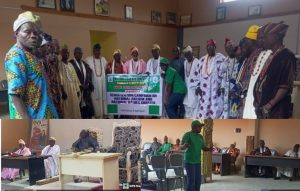Nigerian Values Charter Sensitization Takes Root in Idanre, Traditional Leaders Urged to Uphold National Ideals
In a continued effort to raise awareness of the National Value Charter (NVC) across the country, the Idanre Local Government Area office of the National Orientation Agency (NOA) organized a sensitization programme on Saturday, October 12, 2024, at the palace of the late Owa of Odode Idanre, Oba Fredrick Aroloye Arubiefin IV.
The event focused on the Nigerian Promise and the Citizen Codes, targeting traditional and royal fathers, recognized as custodians of culture and closest to the people.
During the Programme, Mrs Busola Olumide-Atiba, Assistant Director NOA (O & M) in Charge of Idanre LG, emphasized that the nation is on the path of value recovery. She highlighted that the Nigerian state is committed to fulfilling its promises and responsibilities, while citizens will be sensitized and mobilized to play their roles effectively.
Mrs. Olumide-Atiba explained that this would be achieved through institutionalized policies.
She called on the traditional leaders to adopt the message of the National Value Charter and pass it on to their communities. The NVC contains two major elements: the seven Nigerian Promises, which represent commitments made by leaders, and the seven Citizen Codes, which outline citizens’ obligations to the nation. These elements are reinforced by seven institutionalization policies designed to guide the relationship between the government and its people.
Key messages delivered during the program included: The National Values Charter reflects a social contract between Nigeria and its citizens, meant to shape the relationship between the people and the state.
The values, beliefs, and ideologies outlined in the NVC are essential for national development and should guide citizens toward making honourable choices.
Traditional leaders, respected and followed by their subjects, have a crucial role in promoting the NVC’s content, helping to restore the ideals that once brought glory to Nigeria. The Nigerian state can now be held accountable by its citizens, thanks to institutionalized policies that ensure mutual responsibility.
Elected and appointed leaders must see themselves as representatives of the people, while citizens must actively participate in development as a civic duty. And Great nations are built on strong institutions, and the Nigerian project must be institutionalized, with policies that transcend political affiliations to achieve long-term national goals.
The traditional leaders in attendance expressed initial skepticism but acknowledged the need to remain hopeful. They urged the state not to let the citizens down, recognizing that previous disappointments have caused a growing distrust between the people and their leaders. Despite these concerns, they affirmed their commitment to supporting the initiative, noting that Nigeria is the only home they have.
The event marked a significant step in bridging the gap between the government and its citizens through the promotion of shared values and responsibilities under the National Value Charter.
Among the chiefs present where: High Chief Adetuyi Emmanuel, the Odunwo of Idanre kingdom, High Chief Rufus Akinnawonu, the Neren of Idanre land, High Chief Rufus Olatunji, the Lisagha of Idanre kingdom, High Chief Boluwaji Akinnibosun, the Ojumu of Idanre kingdom, Chief Christopher Akinnuwesi, the Rookan of Idanre kingdom , Chief Akinjo, the Bajunuwa of Idanre kingdom. Chief Olumide Ogunfusika, the Manare of Idanre kingdom, Chief Bello Ilemobayo, the Adaja of Idanre kingdom and Chief Idowu Odeyemi, the Lomofe of Idanre kingdom.
